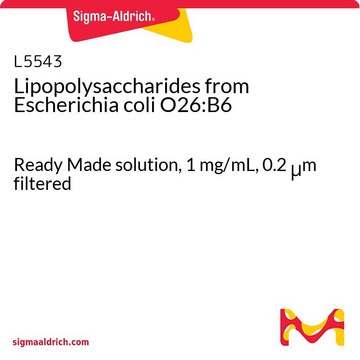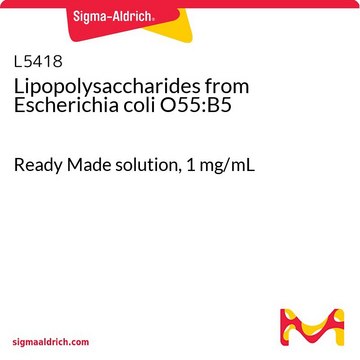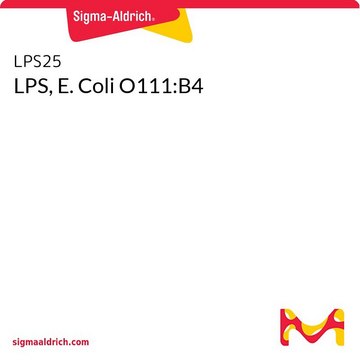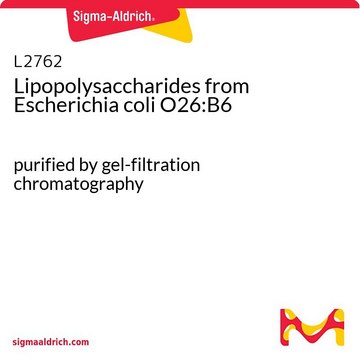L9641
Lipopolysaccharides (rough strains) from Escherichia coli EH100 (Ra mutant)
Sinónimos:
LPS
Iniciar sesiónpara Ver la Fijación de precios por contrato y de la organización
About This Item
Productos recomendados
biological source
Escherichia coli (EH100 Ra mutant)
Quality Level
form
lyophilized powder
impurities
<3% Protein (Lowry)
color
white to yellow
solubility
water: 4.90-5.10 mg/mL, cloudy to turbid, colorless to faintly yellow
shipped in
ambient
storage temp.
2-8°C
General description
This product is phenol:chloroform:petroleum ether extracted from E. coli EH 100 (Ra mutant). The source strain is from a private collection.
Biochem/physiol Actions
Lipopolysaccharides (LPS) are localized in the outer layer of the membrane and are, in noncapsulated strains, exposed on the cell surface. They contribute to the integrity of the outer membrane, and protect the cell against the action of bile salts and lipophilic antibiotics.
Preparation Note
Prepared by phenol-chloroform-petroleum ether extraction.
The product is soluble in water (5 mg/ml) or cell culture medium (1 mg/ml) yielding a hazy, faint yellow solution. A more concentrated, though still hazy, solution (20 mg/ml) has been achieved in aqueous saline after vortexing and warming to 70-80 oC. Lipopolysaccharides are molecules that form micelles in every solvent. Hazy solutions are observed in water and phosphate buffered saline. Organic solvents do not give clearer solutions. Methanol yields a turbid suspension with floaters, while water yields a homogeneously hazy solution.
The product is soluble in water (5 mg/ml) or cell culture medium (1 mg/ml) yielding a hazy, faint yellow solution. A more concentrated, though still hazy, solution (20 mg/ml) has been achieved in aqueous saline after vortexing and warming to 70-80 oC. Lipopolysaccharides are molecules that form micelles in every solvent. Hazy solutions are observed in water and phosphate buffered saline. Organic solvents do not give clearer solutions. Methanol yields a turbid suspension with floaters, while water yields a homogeneously hazy solution.
Other Notes
To gain a comprehensive understanding of our extensive range of Lipopolysaccharides for your research, we encourage you to visit our Carbohydrates Category page.
signalword
Danger
hcodes
Hazard Classifications
Acute Tox. 2 Oral
Storage Class
6.1A - Combustible acute toxic Cat. 1 and 2 / very toxic hazardous materials
wgk_germany
WGK 3
flash_point_f
Not applicable
flash_point_c
Not applicable
ppe
Eyeshields, Gloves, type N95 (US)
Elija entre una de las versiones más recientes:
¿Ya tiene este producto?
Encuentre la documentación para los productos que ha comprado recientemente en la Biblioteca de documentos.
Los clientes también vieron
Zhujun Yi et al.
Frontiers in immunology, 11, 595316-595316 (2021-02-06)
Pyruvate kinase M2 (PKM2) is a key glycolysis enzyme, and its effect on macrophages has not been entirely elucidated. Here, we identified that the PKM2 small-molecule agonist TEPP-46 mediated PKM2 activation by inducing the formation of PKM2 tetramer and promoted
Ji Hyung Kim et al.
PloS one, 7(9), e45348-e45348 (2012-10-03)
During interaction with APCs, invariant (i) NKT cells are thought to be indirectly activated by TLR4-dependently activated APCs. However, whether TLR4 directly activates iNKT cells is unknown. Therefore, the expression and function of TLR4 in iNKT cells were investigated. Flow
Sonia Zambrano et al.
Journal of the American Society of Nephrology : JASN, 30(9), 1573-1586 (2019-07-10)
Inflammatory processes play an important role in the pathogenesis of glomerulopathies. Finding novel ways to suppress glomerular inflammation may offer a new way to stop disease progression. However, the molecular mechanisms that initiate and drive inflammation in the glomerulus are
Kelly M DeMars et al.
Biochemical and biophysical research communications, 497(1), 410-415 (2018-02-16)
Bromodomain and extraterminal (BET) proteins are essential to pro-inflammatory gene transcription. The BET family proteins, BRD2, BRD3, BRD4, and testis-specific BRDT, couple chromatin remodeling to gene transcription, acting as histone acetyltransferases, scaffolds for transcription complexes, and markers of histone acetylation.
Nuestro equipo de científicos tiene experiencia en todas las áreas de investigación: Ciencias de la vida, Ciencia de los materiales, Síntesis química, Cromatografía, Analítica y muchas otras.
Póngase en contacto con el Servicio técnico





